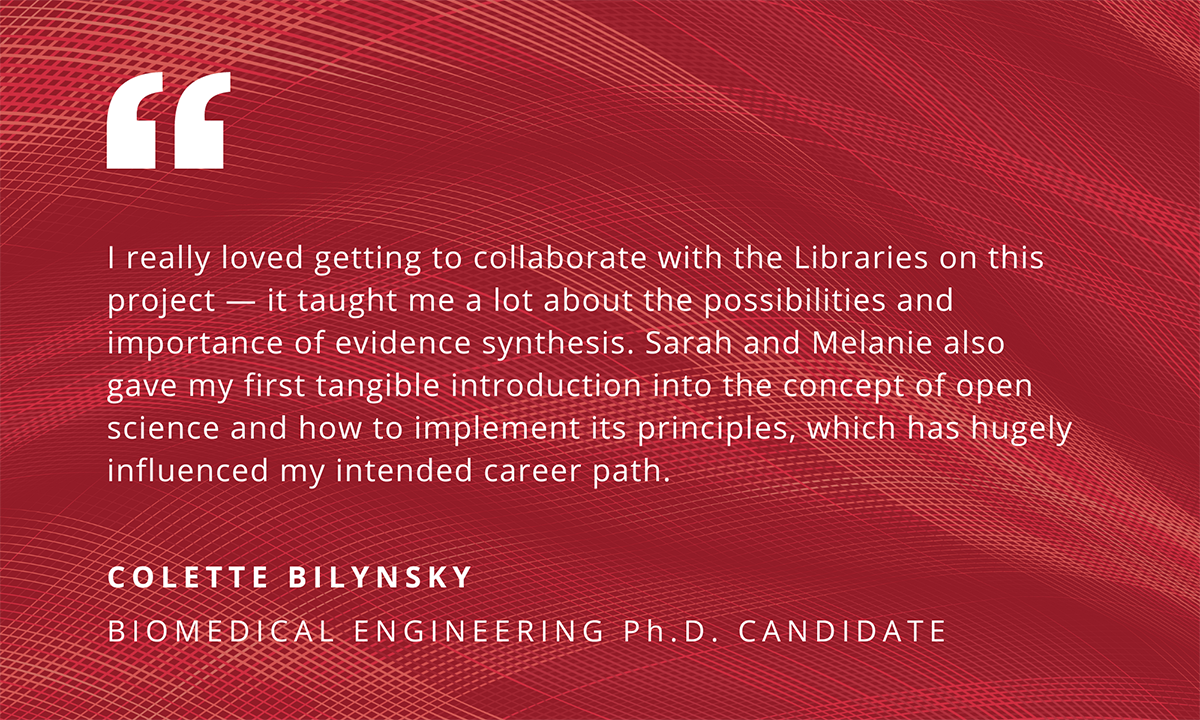
The University Libraries’ Evidence Synthesis Service team has offered their expertise to a number of complex, long-term projects taking place across campus. Since October 2019, Open Science Program Director and Librarian Melanie Gainey and Principal Librarian Sarah Young have collaborated with Biomedical Engineering and Chemical Engineering Assistant Professor Elizabeth Wayne. Their project is a scoping review about the interactions of nanoparticle-based cancer immunotherapy and macrophages in colorectal cancer.
Early in the process, biomedical engineering Ph.D. candidate Colette Bilynsky, who is conducting her thesis research in Wayne’s lab, came aboard the project. Through collaboration with Gainey and Young, Bilynsky was able to gain expertise in open synthesis, the application of open science practices to evidence synthesis methodologies.
Goal
- Complete a scoping review addressing the following question: Is there an identifiable relationship between characteristics of nanoparticle-based immunotherapy and the ability to modulate macrophage polarization in the tumor microenvironment in colorectal cancer?
How We Helped
- As collaborators on the scoping review, Gainey and Young provided expertise on scoping review methodology and tools, helped refine the research question, developed and conducted literature searches, assisted with data management and documentation for the project, implemented machine learning-based approaches for screening a very large body of literature, and co-wrote the methods sections of the papers.
- As experts in open science, Gainey and Young also worked with Bilynsky to take extra steps to make the scoping review transparent, reproducible, and reusable.
Results
- The finished scoping review holds promise as a valuable resource for biomedical researchers — it’s likely the most comprehensive view and synthesis of the topic.
- Bilynsky is the first author of the scoping review and an associated data paper that will be submitted to Data in Brief and another journal this fall. She is also a middle author on a third paper, led by now-former CMU Engineering Masters student Chloe Brown, that explores applying topic modeling methods to their scoping review dataset to automate data extraction beyond what could be done manually. This work is currently out for peer review at PLOS One, and a preprint has been published on bioRxiv.
- Through this process, Bilynsky had the opportunity to implement open science practices, such as developing ideas about open synthesis, preregistering a protocol, cleaning the data and documenting metadata to improve the reusability of the dataset, and publicly sharing the data. Bilynsky is exploring career paths that intersect with open science and is currently writing an article about the intersection of evidence synthesis and open science to be submitted next month for a special issue in the Journal of Science Policy and Governance. She also recently joined the Open Science Advisory Board for the Open Science and Data Collaborations program in the Libraries to help shape how CMU Libraries supports open science on campus.
Feature image quote: "I really loved getting to collaborate with the Libraries on this project - it taught me a lot about the possibilities and importance of evidence synthesis. Sarah and Melanie also gave my first tangible introduction into the concept of open science and how to implement its principles, which has hugely influenced my intended career path." - Colette Bilynsky, Biomedical Engineering Ph.D. Candidate
